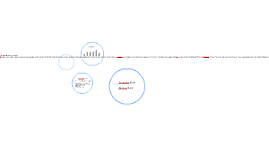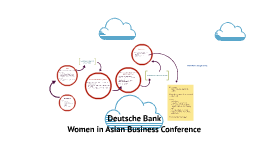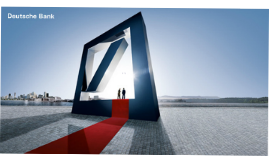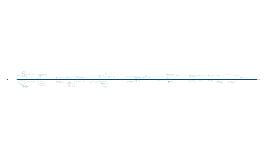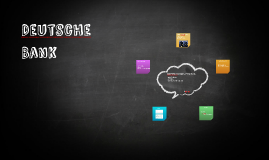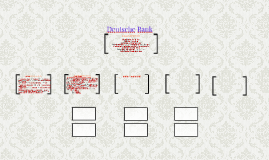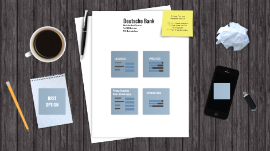Deutsche Bank
Transcript: 1-43 Deutsche Lane Tel: 284-Deutsche Hi there! This is an interactive Prezi CV. Use your mouse to explore it (zoom in/out with the scroll button) or simply follow the slides. Deutsche Bank Deutsche Head Quarters Deutsche Bank MESSAGES MAIIA WHITE HORACIO FERNANDEZ FRANCISCO HERRERA RACHELLE LAURENT BUSINESS ETHICS GROUP CHAT Ethical Issue EDUCATION Money Laundering In 2017, Deutsche Bank was fined a total of $630 million (€553.5 million) by US and UK financial authorities over accusations of having laundered money out of Russia. According to US and British regulators, Deutsche Bank's anti-money laundering control mechanisms failed to spot sham trades with a value of up to $10 billion, not knowing who the customers involved in the trades were and where their money came from. "These flaws allowed a corrupt group of bank traders and offshore entities to improperly and covertly transfer more than $10 billion out of Russia," the regulators said. Laundering Russian money Relevant Facts Facts The pair identified numerous “high-risk entities”. They included 1,244 in the US, 329 in the UK and 950 in Germany. These entities were responsible for nearly 700,000 transactions, the report says, involving at least £62m in the UK, $47m in the US, and €55m in Germany. As part of its investigation, Deutsche Bank sent 149 “suspicious activity reports” to the National Crime Agency in London. Similar disclosures of potential money-laundering transactions were made to authorities in the US and elsewhere – with 30 private and corporate Deutsche Bank clients reported. Some may have been “unknowingly used”, the report says. The affair is a further blow to Deutsche Banks’s ailing reputation. It comes amid police raids on its Frankfurt HQ over the Panama Papers, a plunging share price and talks over a possible merger with Germany’s Commerzbank. The raid last November came after German prosecutors alleged two bank employees helped clients launder money via offshore firms. Deutsche is also under scrutiny in Washington over its financial dealings with Donald Trump. On 15 April, Democrats from the House intelligence and financial services committees issued a subpoena, demanding the bank provide documents about its lending to the president. Over two decades, Trump borrowed more than $2bn from Deutsche. In 2008, he defaulted on a $45m loan repayment and sued the bank. Its private wealth division in New York subsequently loaned Trump a further $300m – a move that bemused insiders and which has yet to be fully explained. In recent years, the bank has had a series of bruising encounters with international regulators. Between 2011 and 2018, it paid $14.5bn in fines, with exposure to dubious Russian money a regular theme Stakeholders CODE OF CONDUCT CODE OF CONDUCT The code articulates what our bank stands for and what we want our overall culture to be. We want to foster an environment that is open and diverse, where staff opinions and "speaking up" are valued and our employees ' and the firms success is built on respect , collaboration and teamwork in serving our clients, stakehlders and communities. We have embedded our values and beliefs in our recruiting, interviewing, and on-boarding processes as well as developments activites. In 2014, we focused on engaging employees throughout Deutsche Bank with what these values mean. We encourage visible and measurable changes in behavior as well in policies, processes, and practices. Workshops across Deutsche Bank aim to engage small groups and reinforce the need for alignment and change, while also identifying opportunities to drive business performance. VALUES VALUES Last year, dozens of police raided six Deutsche Bank offices in and around Frankfurt over money laundering allegations linked to the "Panama Papers". Germany's Financial market watchdog BaFin last year ordered Deutsche to do more to prevent money laundering. In 2017, Deutsche Bank was fined nearly $700 million for artificial trades between Moscow, London and Newyork that could have been used for money laundering. An investigation by the U.S. Department of Justice is sttill ongoing. CONSEQUENCES CONSEQUENCES Deutsche Bank attaches great importance to protecting labor right and employee rights. We respect the right to freedom of association and collective bargaining, and we cultivate a constructive and trust-based relationship with employee representatives and trade unions at alll levels. We are paying greater attention to appropriate behavior by busness partners. RIGHTS/ DUTIES RIGHTS/DUTIES Virtues Deutsche Bank did not apply. . . 1. Purity 2. Temperance 3. Charity 4. Diligence 5. Patience 6. Kindness 7. Humility Relevant Relationships RELEVANT RELATIONSHIPS After Russia’s incursion into Crimea, sanctions by the European Union and the U.S. against Russia forced President Putin to declare “offshorization” illegal in an attempt to keep Russian businesses at home and prevent the declining exchange rate of the ruble from damaging the Russian






